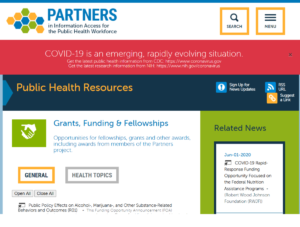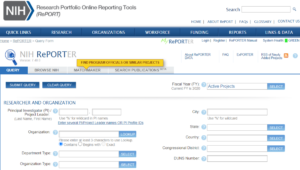
There are several different approaches you can take to find funding:
- Web Search
- Funder webpages
- Searchable databases
- Look at what’s been funded
| Web Search |
This is pretty straight forward. Use your favorite browser and use terms specific to your research. You can make the search relatively narrow –
Who funds liver physiology research?
Or you can make the search broad – this type of search will bring up a lot of university related websites posting information for their postdocs
Who funds postdoctoral research?
As you search and find opportunities that might work for you, take the language used by the funders to direct additional searches
| Funder Webpages |
Funding can come from different sources (disease associations, professional associations, industry, the government, etc)
Each of these sources has their own website where they advertise their funding opportunities.
An easy way to keep up with the available funding opportunities, is to sign up to receive electronic alerts from the funder. This is especially true for grants from the federal government. Several of the listservs you should subscribe to include:

NIH Guide to Grants and Contracts
In addition to the general funding listservs above, you should make sure you’re signed up to receive news from the Institute or Centers that are most likely to fund your research. Remember that there may be more than one Institutes or Center that could fund your research – For example a project investigating the use of massage for cancer-related fatigue could be funded by the National Cancer Institute (NCI) or the National Center for Complementary and Integrative Health (NCCIH). Or as actually happened in the case of this project, the NCI and NCCIH cooperatively funded the project. So think creatively about who might be interested in funding your research:
- What is the Disease/Health relevance?
- What population is the research relevant to (child, elderly, under-represented minority, etc)?
- What methods are you using or developing (imaging, genetics, mobile technology, etc)?
- What outcomes (quality of life, behavior, policy, etc) are you interested in?
| Searchable Databases |
There are a number of sites that gather information from potential funders. One such site is Partners
 Partners has a listing of over 60 searchable databases and funding sources – You can set up a profile and receive notices of funding opportunities that might be relevant to you or your research
Partners has a listing of over 60 searchable databases and funding sources – You can set up a profile and receive notices of funding opportunities that might be relevant to you or your research
As an Emory Postdoc, you have access to two other funding databases. You can access these database directly using your Emory email.

Grant Forward (over 9000 sponsors) Allows you to set filters and receive notifications of relevant funding

Foundation Directory Online (140,000 foundations) Also has grant writing resources
| Look at what has been funded |
Who is funding research that is related to your research? One way to find out is to pay attention when you are reading published manuscripts. Almost all of publications will acknowledge the funder of the research.
To see which NIH Institutes and Centers are funding research like yours, you can use NIH Reporter.

NIH RePORTER allows you to “search a repository of NIH-funded research projects and access publications and patents resulting from that funding”.
NIH Reporter allows you to examine published abstracts of funded NIH research to see how others in your field describe their Specific Aims which are typically included in the Abstract
You can do searches to determine:
- Who is funded to do what I do?
- Where are they doing it?
- Which Institute is funding this work?
- See all funded awards at Emory or in Georgia
| Additional Resources for Finding Funding |
NATUREJOBS BLOG – The postdoc series: Finding Funding
Science – Where to search for funding

Recent Comments